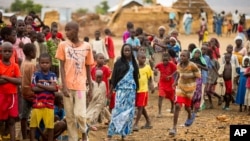The African Union Peace and Security Council has urged Cameroon to ensure the repatriation of Nigerian refugees fleeing Boko Haram is done on a voluntary basis.
Hundreds of refugees, most of them children, complain they are thirsty and hungry as they leave Cameroon on their way back to Nigeria.
They are escorted by troops from the multinational joint task force fighting the Boko Haram insurgency.
Cameroon Red Cross official Joseph Guisso is among the humanitarian staff accompanying the refugees. He said the military escort is necessary because Boko Haram fighters can surprise them at any moment.
He said they have confidence in the task force and strongly believe the killings will end soon.
The soldiers told VOA Boko Haram has been organizing sporadic attacks on a small scale since January. During the past two years, the regional force has retaken much of the territory Boko Haram once controlled.
The number of Nigerian refugees repatriated from Cameroon has not been made public. In March, the governments of the two countries signed a tripartite agreement with UNHCR that stipulated the repatriations must be voluntary.
In June, the U.N. refugee agency condemned what it called the Cameroonian government’s forced repatriation of 887 Nigerian refugees to the border town of Banki. The United Nations said there had been other similar incidents.
Cameroon’s government has denied allegations of forced returns.
Cameroon has struggled to meet the humanitarian needs of the approximately 115,000 Nigerian refugees within its borders, as well as an estimated 200,000 Cameroonians displaced by the conflict.
Suicide attacks have picked up recently in border areas in Cameroon, with at least 30 attacks reported in June, including some targeting refugee camps. Far North region of Cameroon Governor Midjiyawa Bakari has argued it would be better for refugees to go to safer localities in their own country.
A delegation from the African Union visited the northern town of Maroua on Friday. The chairman of the African Union Peace and Security Council, Nigerian-born Ambassador Bankole Adeoye, led the delegation. He told VOA only refugees who choose to go back should be repatriated.
"We want to thank the government and people of Cameroon first for hosting these refugees and coordinating all the necessary sectors. With the United Nations agencies, we are suggesting and proposing that all the refugees should return in safety and in dignity," said Adeoye.
Aid agencies have also expressed concern about the conditions to which refugees are returning. UNHCR and Doctors without Borders have warned food, water and other resources are dangerously overstretched in border communities in Nigeria.




